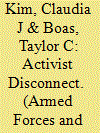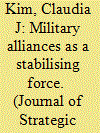| Srl | Item |
| 1 |
ID:
174839


|
|
|
|
|
| Summary/Abstract |
Do activists seeking to challenge the U.S. military presence overseas succeed in persuading the local population? While the comparative literature on base contestation often makes implicit causal claims about public opinion and behavior, these claims have never been tested empirically using individual-level data. Based on an online survey, experiment with residents of communities hosting U.S. military bases in Korea and Japan, we demonstrate a disconnect between anti-base movements and local residents. Local public opinion is most responsive to pragmatic framing of opposition by social movements and tangible information about the consequences of base expansion. Other common activist tactics have little effect and may even backfire. Our findings fill an important gap in the growing literature on the politics of U.S. military bases abroad.
|
|
|
|
|
|
|
|
|
|
|
|
|
|
|
|
| 2 |
ID:
183165


|
|
|
|
|
| Summary/Abstract |
Two broad and seemingly contradictory perspectives exist on U.S. alliances with South Korea and Taiwan. One focuses on how Washington carefully designed the alliances to rein in its overly warlike junior partners, while the other focuses on the surprisingly big influence of Seoul and Taipei that belied the power asymmetry in their relationships with Washington. This paper shows the influence of small allies is not a static feature of asymmetrical alliances designed to restrain them; small allies might exert unduly large influence at the stage of alliance formation, but once the alliance is institutionalised, they may lose much of the initial leverage. The findings lend empirical support to the view of alliances as a stabilising force, rather than a force multiplier, in international politics.
|
|
|
|
|
|
|
|
|
|
|
|
|
|
|
|
| 3 |
ID:
152092


|
|
|
|
|
| Summary/Abstract |
When do anti-base movements manage to influence policy, and when do they fail to do so? Base scholars have largely overlooked what I argue is a significant factor that can shape public and government response to anti-base movements: political opportunities associate with framing efforts by key actors involved. Based on two cases of anti-base movements in South Korea, I show how framing battles between activists and media shape political opportunities afforded to anti-base movements and can ultimately influence movement success.
|
|
|
|
|
|
|
|
|
|
|
|
|
|
|
|